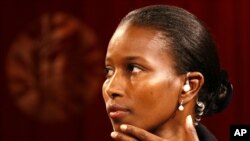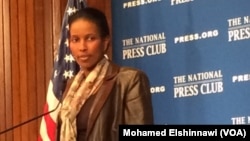Ayaan Hirsi Ali, Irshad Manji and Rebiya Kadeer came together Thursday from different corners of the world.
One of them survived childhood abuse, violence and a forced marriage in Somalia. Another receives frequent death threats and was the victim of an attack by Muslim extremists in Indonesia. And the other spent seven years in jail in China.
On a single stage Thursday in Washington, D.C., they looked at each other repeatedly without exchanging a single word. The shared looks were an implicit reaffirmation of what bound them together: the fight for human rights.
Thursday, on International Human Rights Day, the three women were awarded the Lantos Human Rights Prize.
The award is named after U.S. Congressman Tom Lantos, the only Holocaust survivor ever elected to Congress. Lantos was a fierce advocate for human rights, and his legacy can be felt in the halls of Capitol Hill where the Tom Lantos Human Rights Commission routinely serves as a forum that defends human rights around the globe.
Since 2009, the Lantos Foundation has awarded the annual prize. In previous years, it has gone to the Dalai Lama and the Chinese human rights activist Chen Guangcheng, among others.
This year, for the first time, three women of Muslim backgrounds received the award.
From janitor to Parliament
Ayaan Hirsi Ali was born in Somalia in 1969. As a girl, she endured female genital mutilation. According to the World Health Organization, more than 125 million females — usually under the age of 15 — have been subjected to the process.
Later, Hirsi Ali was forced by her father to marry a distant cousin. That was when she decided to flee to The Netherlands.
There, she went from being a janitor and a translator to a member of the Dutch Parliament. For years, she has dedicated her life to fighting for women's rights. No religion or culture justifies abuses against women, she says.
"The fact that my religion, the religion I grew up in — I am not a Muslim anymore but the religion I grew up in — is used as a tool to kill people, to rape women, to spread anti-Semitism, to throw gay people from tall buildings, it's embarrassing, it's disgusting, and I feel responsible to come out and say something about it and do something about it in the most peaceful ways," Hirsi Ali said.
But those peaceful means can spark violence in others.
Filmmaker Theo Van Gogh worked with Hirsi Ali on Submission, a film about the oppression of Muslim women. In 2004, Van Gogh was stabbed to death in broad daylight in the streets of Amsterdam. The perpetrator, who had terrorist ties, left a note pinned on Van Gogh's chest.
It was a death threat against Hirsi Ali.
But death threats have not stopped her from fighting for the rights of women around the world.
Rejection follows her
Irshad Manji, 46, was born in Uganda and moved to Canada when she was four. There, she grew up in a violent household. By the time she was 14, she was expelled from Islamic school for asking too many questions.
So she started studying Islam on her own. It was then, she says, that she realized she could reconcile her faith with different freedoms and rights.
For years, she has been a leading voice in the reform of Islam.
Her work has not been well received in many parts of the world, and she receives so many death threats that the windows of her apartment are bulletproof. During public appearances, Muslim extremists have stormed in and demanded her execution.
Manji said that receiving the award is about more than just Islam. It is about all human beings.
"This award represents for me the rare quality that I believe every human being has the capacity to develop, but most of us don't give ourselves the permission to develop, and that is moral courage — which means doing the right thing in the face of your fears," Manji said.
Imprisoned for 6 years
Rebiya Kadeer is known as the "Mother of all Uighurs," an oppressed Muslim population in northwest China.
Kadeer, 69, came from poverty. She is now a millionaire entrepreneur. But, mostly, she is one of the faces of the Uighurs, a group that says it has been victimized by the Chinese government for decades.
Kadeer held various posts in Chinese political life before being arrested in 1999 for passing publications to her husband, who at the time was living in the United States and working for Radio Free Asia and Voice of America. She was accused of providing confidential materials to a person outside of the Chinese territory.
In 2005, she was released and moved to the United States. She still is a fierce critic of the authorities in Beijing and their treatment of Chinese Muslims.
"The Uighur issue is not a Uighur problem,” Kadeer said. “It is a Chinese government problem. A situation generated by systematic denial to Uighurs of fundamental human rights and freedoms.”







